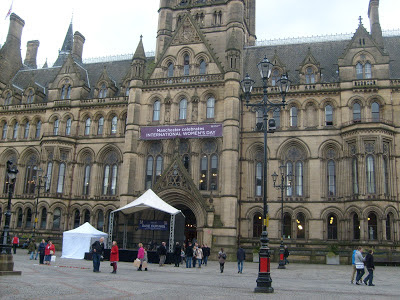'Homeless near a thousand homes'
“The neglect to which the great mass of working-men's children are condemned leaves ineradicable traces and brings the enfeeblement of the whole race of workers with it.”
'The Condition of the Working Class in England', Friedrich Engels, 1844
 |
| Manchester Town Hall |
This was Manchester in the Nineteenth Century; a whirlwind of manufacturing and opportunity which drove people from the rural areas into the heart of the city looking for work. The results of this are well-known, overcrowding, poor sanitary conditions and disease making living conditions for the poor abject at best.
For the middle and upper classes it was a time of increased wealth and a chance to improve their social status. Many were taught that conditions for the poor and ill were hardships brought on by themselves, creating a mentality that the poor were undeserving and did not need to be helped. This, by power of association, also applied to their children.
Ragged child from the streets
England was relatively late in providing welfare for abandoned children in comparison with other European cities. The period around 1870 however, seemed to be a catalyst for the formation of many of the large children’s charities we still see today. Action for Children (1869), Barnardo’s (1870) and Quarriers (1871) were all formed at the same time as the Manchester and Salford Boys’ and Girls’ Refuges and Homes. So what had changed?
Many of these charities were set up by individuals who had been introduced to the problem of homeless children sleeping out on the streets by so called single heart-warming events. It is likely however, that other changes were also responsible for this shift in attitude. Recent legislative reforms such as the Factory Acts, Poor Law Amendment Act and the 1870 Education Act made people more aware of the problem of street children. Charles Darwin’s publication of ‘On the Origin of Species’ in 1859 also started people questioning their religious teachings and values. It started to create a new attitude that each individual had a duty not only to God but also to their fellow man, social class, neighbour and the poor.
 |
| Working at the Refuge |
The belief remained however that through hard work and determination anyone could become a ‘decent’ member of society. This was reflected in the Refuge’s own philosophy of ‘we help those who try to help themselves’.
Welfare for children was beginning to change.


Comments
Post a Comment
Like to know more about a certain home or period in the Together Trust's history? Why not comment and let us know.
If you have a personal or more specific enquiry please see our 'Contact Us' section at the top of this page to get in touch via email.